The second half of 2022 saw Burnet launch its 2030 strategy, and continue important work in life sciences, public health and international development.
Go to 2022 in Review: January to June
July
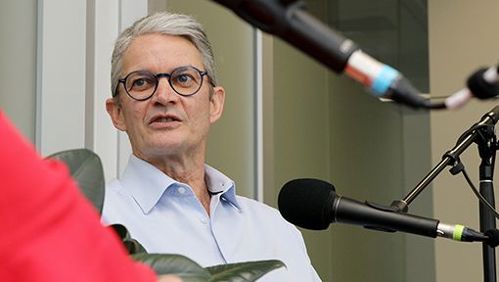
With July seeing Australia’s death toll from COVID-19 having surpassed 10,000 from more than eight million reported cases, Burnet Institute Director and CEO Professor Brendan Crabb AC called for an urgent change of attitude to protect the community from the latest Omicron sub-variants.
Professor Crabb told ABC Radio Melbourne Mornings program a ‘vaccine set-and-forget’ mindset and popular view that ‘COVID’s in the rear-view mirror’ has not served Australia well.
“The individual risk for most people is relatively low, so the mindset that I’m talking about, the casual mindset is totally understandable. But at a community level, where virtually every person in the community is going to get COVID, the numbers and impact then are huge, and that’s where this individual responsibility versus public civic duty thing kicks in.”
Professor Brendan Crabb, Burnet Institute Director and CEO

Deaths related to COVID-19 and the impacts of long COVID were two of the main themes that emerged in the TIGER C19 social media analysis in July too.
The complexity of COVID treatment options and responses, concerns over children in the current environment, and calls for improved ventilation and preventative mask-wearing were also on Australians’ radars on July 7 when the data were collected.

On World Hepatitis Day (July 28), Burnet highlighted a new public health campaign aiming to turn around declining hepatitis C testing and treatment rates to keep Australia on track to eliminate the disease by 2030.
The COVID-19 pandemic and related public health control measures and restrictions have played a part in the declining numbers, with many people delaying seeking routine or primary health care.
The ‘It’s Your Right’ campaign’s goal is to eliminate hepatitis C (hep C) in people who inject drugs.
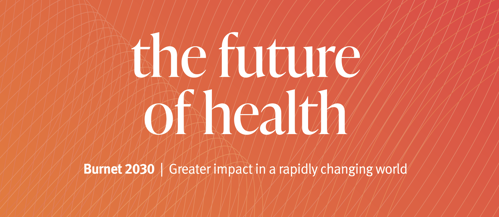
July also saw the launch of Burnet’s bold 2030 strategy, which has a strong commitment to supporting our research programs, environment, and importantly, our people – the very heart of Burnet.
Burnet 2030 focuses on growing our impact, as we help create a future where diseases are eliminated, the world is more prepared, and future generations thrive.
“It’s the first time we’ve looked nearly a decade ahead. And that says a lot about where we are as an institution. And in the world of global health where there are complex problems, technical problems that intersect with poverty, you have to look long term.”
Professor Brendan Crabb, Burnet Institute Director and CEO
August
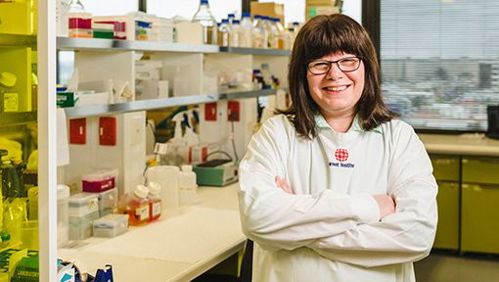
In August Burnet Institute, in collaboration with Monash Institute of Pharmaceutical Sciences (MIPS), announced it had received Proof of Concept funding from BioCurate to develop next-generation human immunodeficiency virus (HIV) antivirals.
The multi-disciplinary research team, led jointly by Burnet’s Head of Life Sciences, Professor Gilda Tachedjian, and leading medicinal chemist Dr David Chalmers (MIPS), has identified a novel HIV target, or new way to attack HIV.
With the financial support and therapeutic development expertise of BioCurate, the team will validate the target and further progress the development of drug candidates.

Burnet Institute modelling for the Victorian Government released in August has demonstrated the benefits of mask-wearing, by showing that increased mask uptake in Victoria could reduce the duration of epidemic peaks and increased the rate of decline afterwards.
Depending on uptake, use of masks between July and October this year could have led to a reduction in cumulative infections and hospital admissions by up to about 20 percent and deaths by up to 14 percent.
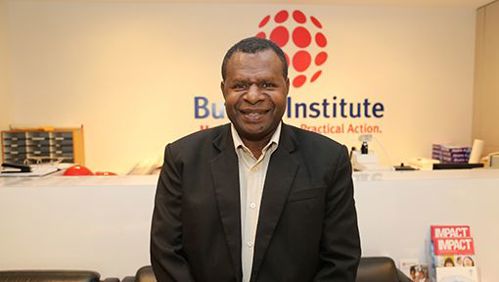
Dr Stenard Hiasihri – a key member of Burnet Institute’s Papua New Guinea (PNG) leadership team – left the Institute in August to take up a senior role with the New Ireland Provincial Health Authority.
Dr Hiasihri was Burnet’s Chief Public Health Officer in PNG, and Team Leader of the Fleming Fund Country Grant for PNG, which is aiming to help tackle antimicrobial resistance in low- and middle-income countries. Over the years, he’s worked in other roles including Acting PNG Country Director for Burnet and Program Manager TB/HIV for The Global Fund.
Members of the Institute paid tribute to his inspiring leadership and friendship over many years.
“Dr Stenard has been instrumental to the growth of Burnet in PNG through his involvement in these various portfolios.”
Dr Kudakwashe Chani, Burnet’s PNG Country Director
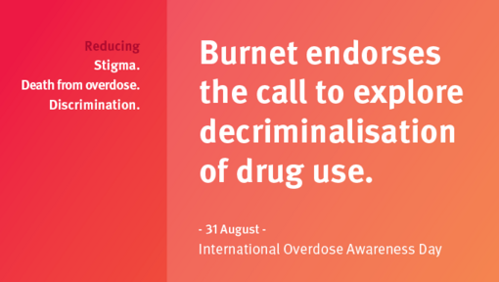
The ongoing criminalisation of drug use contributes significantly to health and community harms, including the transmission of blood-borne viruses, overdose, and entrenched social and economic disadvantage.
On International Overdose Awareness Day – August 31 – Burnet Institute endorsed the call to reform current policy responses to drug use, including exploring opportunities to decriminalise drug use.
The decriminalisation of drug use and drug possession for personal use will help to reduce stigma, deaths from overdose and discrimination towards people who use drugs.
“Evidence from around the world is consistent – criminalisation of drug use and the incarceration of people who use drugs is neither a deterrent to drug use, nor does it make the community safer.”
Professor Mark Stoové, Burnet’s Head of Public Health
September
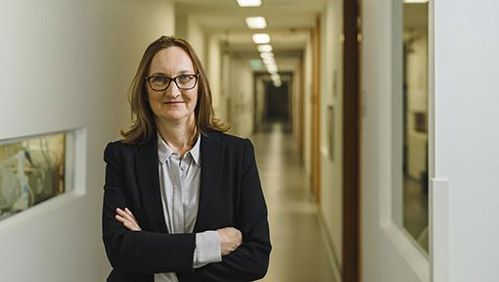
Burnet Institute is part of a consortium led by Monash University, that’s been awarded a $6.3 million Medical Research Future Fund (MRFF) grant to profile COVID-19 vaccine responses in our most vulnerable populations.
The consortium, entitled PROPHECY (Profiling immune RespOnse in Paediatric and High-risk populations to SARS-CoV-2), is led by a diverse team of Melbourne-based scientists and clinician researchers.
Burnet’s Co-Program Director of Disease Elimination, Professor Heidi Drummer, is part of the PROPHECY Executive team.
“I am really delighted to be a part of this multi-institutional consortium to examine how some of our most vulnerable members of the community, those with underlying immune deficiencies and paediatric populations, develop immune responses to COVID-19 vaccines and infection with SARS-CoV-2.”
Professor Heidi Drummer, Burnet’s Co-Program Director of Disease Elimination
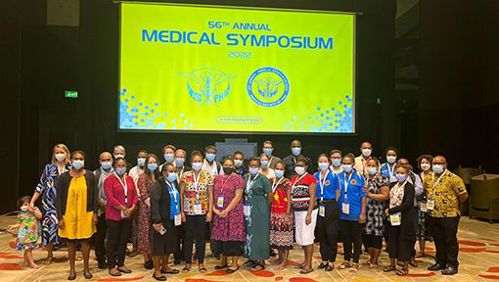
Burnet Institute Senior Research Fellow Dr Stefanie Vaccher based in PNG, reflected on the importance of the 56th Papua New Guinean Medical Symposium held in Port Moresby, PNG from 5 to 7 September 2022.
Thirty-four Burnet staff and researchers attended the symposium from PNG and Australia.
With a recently elected government and a new 10-year National Health Plan, the conference was well-timed to address priority health areas and issues of local and national significance.
“This symposium allowed locally led research to be the focus of the meeting and ensured that future research in PNG would benefit from the sharing of new ideas, successes, and strategies for overcoming challenges.”
Dr Stefanie Vaccher, Epidemiologist

The elimination of hepatitis C in Australia is closer following a AUD$1.4 million boost to research.
This is part of a $14 million investment in 12 research projects announced in September at Burnet Institute by Federal Minister for Health and Aged Care, the Hon Mark Butler MP to help deliver better health care for Australians.
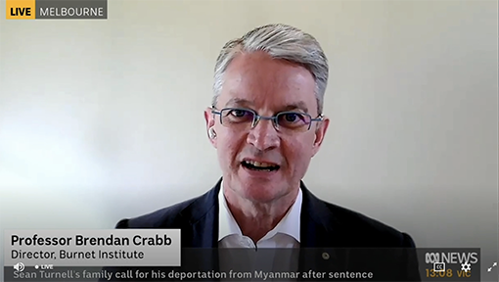
In an interview with ABC TV News Channel’s Ros Childs, Burnet Institute Director and CEO Professor Brendan Crabb AC described the decision by National Cabinet to scrap mandatory COVID isolation as disappointing, illogical and distressing.
“We need these public health interventions to augment what we have. There are good days ahead because we’re getting better vaccines. There will be tools that end this pandemic. We don’t have them now. We seem to have surrendered to the virus for now and for its devastating effects.”
Professor Brendan Crabb, Burnet Institute Director and CEO
October
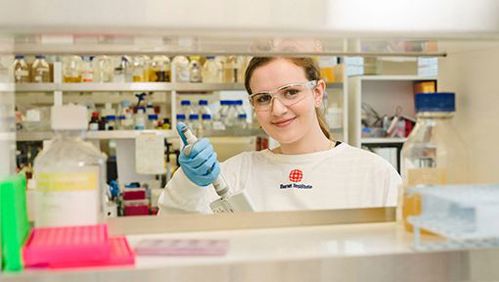
Lactic acid strengthens the junctions between cells in the female genital tract that form a physical barrier to harmful bacteria and viruses.
New Burnet Institute-led research, published in the journal Microbiome, shows another way the metabolite reduces a woman’s risk of getting a sexually transmitted infection (STI).
The researchers are now looking at how this and past discoveries can be used therapeutically.
“Women in Sub-Saharan Africa at risk of HIV for example, are not always in a position to necessarily negotiate other mechanisms of protection like condom use. If we can develop a therapeutic intervention that’s women-led, women-controlled, then they can protect themselves.”
Brianna Jesaveluk, Burnet PhD student
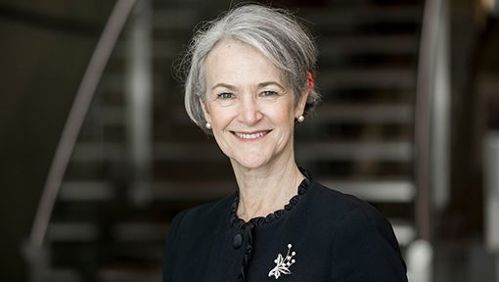
Burnet Institute researchers were awarded over AUD$9.2 million in funding in the latest round of National Health and Medical Research Council (NHMRC) Investigator Grants announced in October.
Five projects across malaria, HIV, hepatitis C, and reducing maternal and newborns deaths received funding.
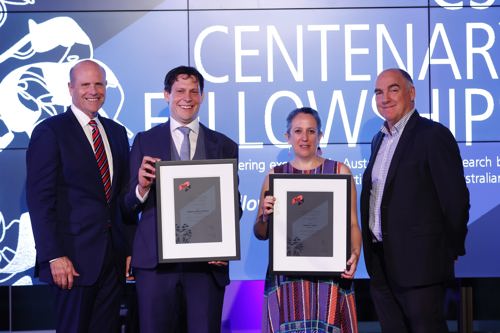
Dr Michelle Boyle has been awarded a AUD$1.25 million CSL Centenary Fellowship to further her work to making malaria vaccines better to save more children.
Dr Boyle has discovered how our immune response to malaria can be disrupted by the malaria parasite, reducing the effectiveness of vaccination in children in malaria-affected communities.
Now, with the help of the $1.25 million CSL Centenary Fellowship, she will work to bypass malaria’s suppression of our body’s defences to boost our immune response. Her research may also help improve vaccines for other chronic diseases.
Currently based at the QIMR Berghofer Medical Research Institute in Brisbane, Dr Boyle is returning to Burnet Institute to set up a new group within the Disease Elimination Program.
November
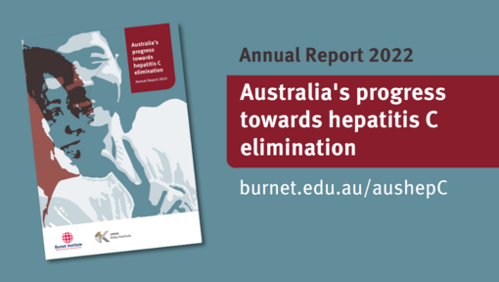
New models of care and more investment are urgently needed to reach people at risk or living with hepatitis C, and engage people lost to care, otherwise Australia risks falling short of its goal to eliminate hepatitis C as a public health threat by 2030.
Key findings of the Burnet Institute and Kirby Institute’s Australia’s progress towards hepatitis C elimination Annual Report for 2022 show the rate of new hepatitis C infections in Australia has declined since 2016 when highly effective direct acting antiviral (DAA) treatments became available, and more than 95,000 people were treated with DAAs between 2016 and 2021.
Report co-author and Burnet Institute Head of Public Health, Professor Mark Stoové warned Australia risks squandering the golden opportunity provided by the DAAs and a first-class health system.
“We’ve got a great foundation in the successes that we’ve had over the last five years, but the approaches that underpinned that foundation are no longer sufficient to achieve elimination. We need to innovate our models of care and work hard to make sure we reach the remaining Australians living with hepatitis C that are yet to be treated.”
Professor Mark Stoové, Burnet’s Head of Public Health
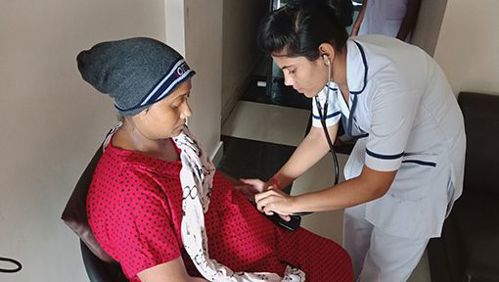
Burnet Institute researchers have led the development of the first global strategic guidelines - called target product profiles (TPPs) - for medicines to prevent and treat pre-eclampsia, a hypertensive disorder in pregnancy that’s one of the leading causes of maternal deaths, stillbirth, and preterm birth globally.
Published in the journal PLOS Global Public Health, the TPPs will help to address a longstanding dearth of innovation, and research and development of new medicines for mothers, particularly for pregnancy-related conditions.
“Of the 300,000 global maternal deaths each year, 14 percent are due to hypertensive disorders, of which pre-eclampsia is the most common.”
Dr Annie McDougall, Senior Research Officer
Prof Brendan Crabb AC FAA FAHMS (@CrabbBrendan) has made fundamental discoveries in malaria pathogenesis @BurnetInstitute including how the malaria parasite proteins attach to its host cell, a major clue to how it reproduces. @BurnetInstitute @AAHMS_health pic.twitter.com/CFabUSk6LB
— Australian Academy of Science (@Science_Academy) November 22, 2022
Burnet Institute Director and CEO Professor Brendan Crabb AC was formally admitted as a Fellow of the Australian Academy of Science at an event at the iconic Shine Dome in November.
Professor Crabb was elected to the Academy in 2021 for several significant discoveries he has made about malaria, but along with other Fellows elected in 2020 and 2021 was not able to be formally admitted until now.

The critical importance of prevention through vaccination and public health measures was a key theme of Burnet Institute’s submission to the House of Representatives Health Committee Inquiry into Long COVID and Repeated COVID Infections.
Submissions to the Inquiry, which aims to build a picture of the health, social, educational, and economic impacts of long COVID and repeated COVID infections on individuals, families and the Australian community to inform public policy recommendations, closed on 18 November.
Significantly, the submission offers a common sense response to the question relating to the best practices to prevent Long COVID - prevention is better than cure.
“Put simply, the best way to prevent Long COVID is to reduce the number of people getting COVID infection. This is done through a combination of vaccination and other public health prevention measures, particularly when cases are rising, and treatment.”
December
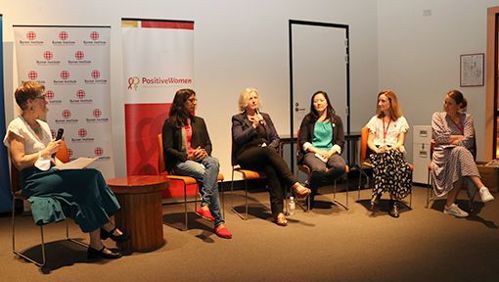
A focus on issues facing women living with HIV and the community’s response to women’s needs was the theme of the World AIDS Day 2022 Official Victorian Community Launch hosted by Living Positive Victoria and Burnet Institute at the Alfred Innovation and Education Hub.
Women continue to bear a huge burden of HIV-related stigma and assumptions about HIV risk, which may affect access to testing, treatment and care, and psychosocial wellbeing.
Women also experience HIV differently from men, with unique problems such as gynaecological health issues, increased risk of cervical cancer, treatment side effects and drug interactions, and ageing related issues.
“We know that there are big differences in how women’s immune systems respond to HIV, and with regards to chronic inflammation and immune disfunction that people with HIV experience there’s evidence that may have more of an effect in women.”
Dr Anna Hearps, Burnet Deputy Program Director of Disease Elimination

The TIGER C19 project has reached the significant milestone of analysing over half a million social media posts on Twitter and Reddit since the start of the pandemic.
Through searching for pertinent keywords on social media, TIGER C19 has tracked how public opinion about COVID-19 in Australia has changed over the course of the pandemic and helped inform public health responses.
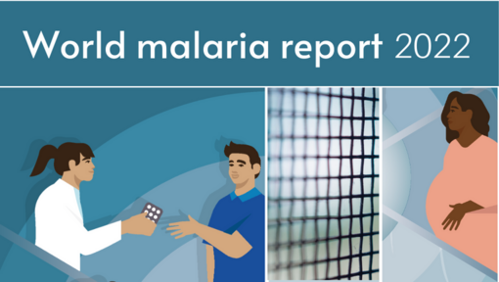
Progress in reducing the burden of malaria remains stalled since 2015 after previous strong gains, reveals the latest data released in December as part of the World Health Organization’s (WHO) World malaria report 2022.
After almost a decade of significant gains, in the last few years progress has stalled, exacerbated further by the COVID-19 pandemic.
This latest data reiterates that there has been no progress in reducing the burden of malaria over the past five years, said Professor James Beeson, Burnet Deputy Director and Head of the Malaria Immunity and Vaccines Group.

Better understand your risk of contracting COVID-19 this summer, and what you can do to keep yourself, your family, your friends and your community safe.
